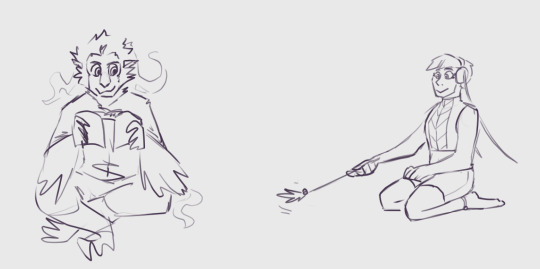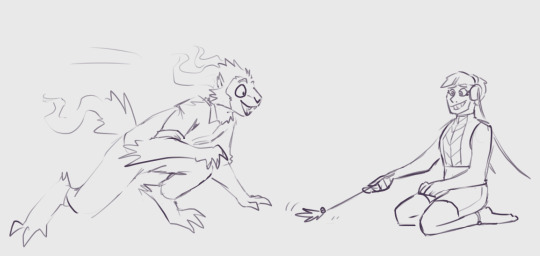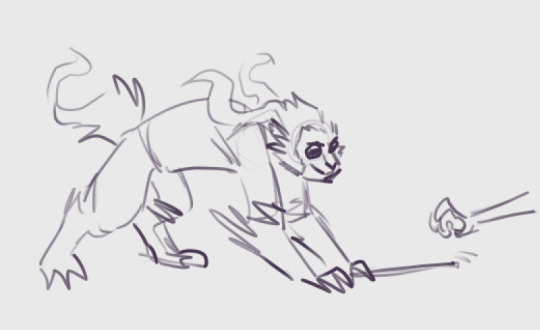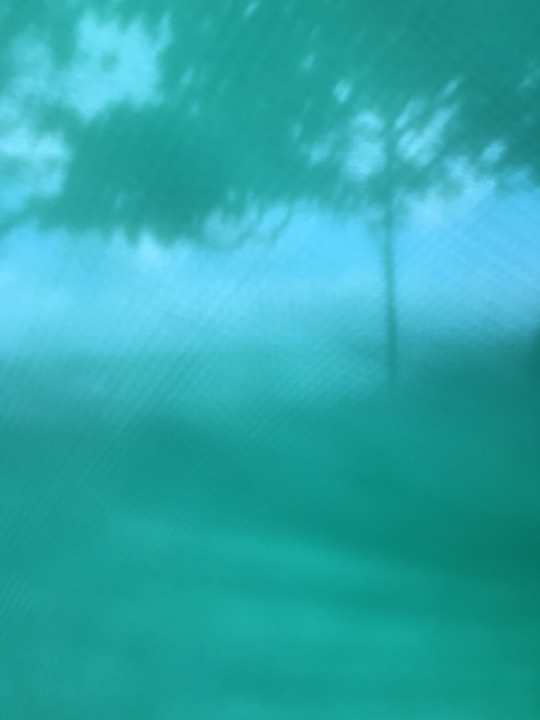#they compel me. sometimes it's just fun to goof off and try to catch the thing
Note
i'm just imagining Elesa just being confused and then tentatively waving one of those pokemon cat toys in front of him to see what he'll do.



plot twist it has nothing to do with his fluffy he's just always been like this. it's nothing new.
sometimes. you just gotta. attack.... the cat toy..... swishey movey thing MUST be stopped. at all costs. you understand this
also

#answered#fulcrum au#emmet#elesa#pokemon#submas au#nimbasa trio#ingo isn't there but. the squad#anyway. brought to you buy:#i. i. i do that. i‚ a 100 percent completely human being. like to play with cat toys sometimes#they compel me. sometimes it's just fun to goof off and try to catch the thing#i intend to draw a worm comic next btw. so there's a 50/50 chance I'll Actually do it. but hey ¯\_(ツ)_/¯
520 notes
·
View notes
Photo

Fresh Listen - Aura Bora, Was (Bandcamp, 2017)
(Some pieces of recorded music operate more like organisms than records. They live, they breathe, they reproduce. Fresh Listen is a periodic review of recently and not-so-recently released albums that crawl among us like radioactive spiders, gifting us with superpowers from their stingers.)
It takes a particular kind of genius to compose a great rock lyric. It doesn’t require a great lyricist, per se. Dylan could certainly toss off a snappy non-sequitur once in a while (See “From a Buick 6″), but mostly had the tendency to spiral into dreamscape, or invoke the meter and imagery of the Bible. And sometimes he would just goof off on “I love you, you love me, goin’ down the sugar tree” pop song dumbness.
Paul Simon’s words, on the other hand, seem sweated from the self-consciousness of an English Lit “A” student with a subscription to The New Yorker and an obsession with figuring crossword puzzles form the Times. Joni Mitchell is too great a Poet in the big “P” sense of the word, too mellifluous and refined, to lumped in with inane and insignificant rock music-word writers, though after a joint or two she might let her hair down and “wreck her stockings in some jukebox dive.”
Even Chuck Berry, who more or less codified the aesthetics of a great rock and roll lyric, was perhaps too evolved a wordsmith for the genre he helped invent. Even though, for presumably commercial reasons, he became fixated on the afternoon minutiae of teenage hi-jinks, his great songs are truly great, by any genre’s measuring cup. “Memphis, Tennessee” is essentially a short story with an unexpected and heartbreaking twist at the end, and “The Promised Land” transforms geography into poetry in a way the Beats attempted but never so successfully (also slipping in a subtle commentary on the racism embedded in this country, in some places more dangerously so than others).
Great rock lyrics don’t aim high. But they cut deep. They don’t purport to be anything more than they are, a tossed off evocation of frustration or longing or dismissiveness (or all three together), a conscious Freudian tumble. For that reason, they threaten a kind of senselessness, if you peer too deeply into them. And you never should peer too deeply into them, unlike, as you might, “Court and Spark.” Their value is face-value only, and if a rock lyric doesn’t strike you once and hard, it might as well pass you by altogether. Jim Hendrix: “Acting funny, but I don’t know why / ‘Scuse me while I kiss the sky.” The Strokes: “Leaving just in time / Staying for a while / Rolling in the ocean / Trying to catch your eye.” Television: “I was listening, listening to the rain / I was hearing, hearing something else.” Hinds: “The satisfaction of / The inundation of / When you ring my bell / And I want to be ready for your smell.” These lyrics suggest and allude to much, but nothing more significant than what the words themselves are, and how they are sung.
By some melding of sympathetic creative minds, the former (they go away so fast) Hawai‘i rock band Aura Bora tapped into a metaphysical Rosetta Stone to translate their primitive heart-wishes into some of most compelling and seemingly effortless rock lyrics I’ve heard from any band, local or otherwise. Was, their 2017 album of eleven songs (two of them covers), is yet another example of how so many talented Hawai‘i-based bands move on from projects that must have squeezed so much time and emotion and embittered love from them (see Linus). Not only did Aura Bora rock hard with a skewed feel for rock riffs and melody, they were able to, with a jeweler’s eye for the brilliance just beyond the blemished surface, universally encapsulate what it meant to be a hard-drinking, band-playing, insecure scenester, beautifully over-analyzing relationships and flitting skittishly around the things they love for fear of the inevitable crushing.
Was (an apt title from a group that posted its music on Bandcamp after disbanding) kicks off with a song that firmly establishes Aura Bora’s sonic profile. apart from an uncharacteristically restrained vocal from singer-guitarist Jhune Liwanag. In fact, the sound of the album and its arrangements and aural inspirations, are consistent throughout all the songs, reminiscent of the best first rock records (Please Please Me, Is This It, to name a couple). Joey Green’s drums are competent and energetic all the way through--perhaps to a fault, as there were a couple opportunities in which subtlety and variation might have better suited the material.
That said, the music doesn’t suffer from the overly competent and loud drums. On that first track, “Whatever,” the one idiosyncrasy is Jhune’s disaffected vocal, adapted per the sentiment of the song. In all other performances, Jhune squeezes an evolving galaxy of rage, lust, anxiety, diffidence, and even affection (though guardedly so) from her singular vocal cords. “Whatever” is a kind of let-down doo-wop in which Caleb Hartsfield lays out the jagged, discordant harmonies through his consistently stunning lead guitar.
Caleb shares a vocal on the duet “Sour Skittles,” notable mostly for the guitarist’s unintelligible shouting. I get that we’re talking punk rock here, but I wish the band would have invested more truth-value into the song, with Caleb attempting tunefulness instead of burying the composition in meaningless emoting (vocals are best left to Jhune).
But Caleb’s contributions to Aura Bora far outweigh his deficiencies. The disappointed “No Good” wrecks his sympatico fills against Jhune’s lines, echoing a kind of lovelorn impatience. And on “Band-Aid,” he locks big into mystifying punk guitar, a sound that is not supposed to make sense but does, the riffs so off as to raise a middle finger to classic rock tropes, rhythmic but unbalanced, dizzied by youthful ferocity. “Band-Aid,” begins as a kiss-off a la “Positively 4th Street” (”You’re not dressed up the way you used to / You’re hair is fading and unkempt / It’s hard to come home from vacation / When you can barely pay the rent”) but, as if buoyed by it’s own relentless energy, the band pushes through toward optimism: “You’ve got some love to give, you just need some direction.” One paper it may come off as a tad twee, but in the context of the song it mixes a strong antidote to alleviate the negativity.
The first of the album’s stand-out tracks is “Gross,” which, if rearranged only slightly, could have been a hit for one of those street-toughened girl-groups of the early 1960s. “Would you like to take a walk with me off the pier of uncertainty?” Jhune sings with a defiance that almost preempts a response in the negative. “I think we share a common goal, the constant struggle to feel whole,” is just one of the lovable couplets in this abrasive seduction she lays on the presumably indifferent recipient of her affections: “I hope my voice gets stuck inside your brain.”
“Getting emotional / There’s danger in writing songs about the people you know” sets “Emotional” up as biography, or the use of art to reconcile and make meaningful the monumental banalities of our life episodes. Less a melody than a screed, June hashes out her memories in an effort to move toward an expression that she herself can own, that is not co-opted or underwritten by the sometimes bad intentions of partners of the past.
I wouldn’t have taken the time to write this post, or to delve as deeply into the music of Aura Bora, if not for “Ghibli Tears,” the extended masterpiece following bassist Will Adair’s otherwise undistinguished “Ghibli Beers.” “If you could hear my inner monologue / You’d be enamored of my thoughts / Are you still with that guy who told you not to smile?” Jhune sings, in one of the more tender tonalities on the human spectrum. But the power with which Jhune swings her emotional fist--as a singer-guitarist as well as a songwriter--is that she refuses to play a character in someone else’s story. Her thrust is in defining herself and her state of mind, not abdicating that authority out of need or desire. When Jhune declares, “To be honest, I’d rather be feared than liked / I won’t say yes if you ask me to spend the night / But I’ll take saccharine over nothing,” she reclaims a narrative that initially presents her a vulnerable. On “Ghibli Tears,” and throughout Was, the persona Jhune creates is so compelling--despite the ridiculousness and hypocrisies inherent in coupling up she remains, just past the exterior hardened by a string of unworthy and memorable-only-in-their-badness affairs, open to love and hope and the struggle to, as she puts it, “feel whole.” “Ghibli Tears” is more than a song, it is six or so minutes of that buried lonesomeness that resounds when, despite all that it is around us, we recognize that there is, undeniably, something missing against which the evocation of loneliness can resound.
The covers (”Falling Out of Love With You” and “We Are the Crystal Gems”) are fun and would have added levity, I’m sure, to Aura Bora’s live repertoire.
Like so much I write about on Fresh Listen, I’d like to see this record float, hopefully to some distant shore, to a new tribe of listeners that hear themselves as I hear versions of myself in these songs. The tragedy would be to let them sink under the tide of digital sonic trash widely available over the Internet. In the plainest lyrical terms, and with their indefatigable musical arrangements, Aura Bora documents, with a wicked sense of humor and hope, how hard it is sometimes: the human condition.
0 notes